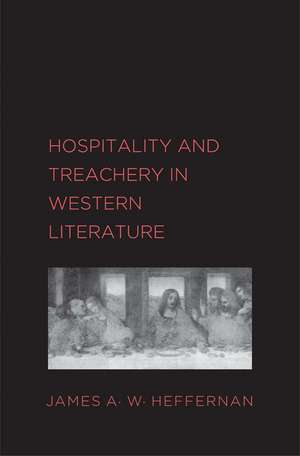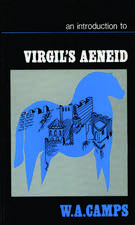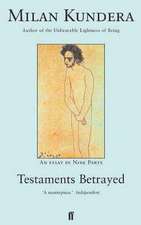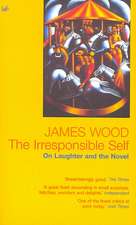Hospitality and Treachery in Western Literature
Autor James A. W. Heffernanen Limba Engleză Hardback – 27 mai 2014
In works of Western literature ranging from Homer’s Odyssey to Albee’s Who’s Afraid of Virginia Woolf? the giving and taking of hospitality is sometimes pleasurable, but more often perilous. Heffernan traces this leitmotiv through the history of our greatest writings, including Christ’s Last Supper, Macbeth’s murder of his royal guest, and Camus’s short story on French colonialism in Arab Algeria. By means of such examples and many more, this book considers what literary hosts, hostesses, and guests do to as well as for each other. In doing so, it shows how often treachery rends the fabric of trust that hospitality weaves.
Preț: 503.50 lei
Preț vechi: 653.89 lei
-23% Nou
Puncte Express: 755
Preț estimativ în valută:
96.37€ • 99.31$ • 81.36£
96.37€ • 99.31$ • 81.36£
Carte tipărită la comandă
Livrare economică 03-17 martie
Preluare comenzi: 021 569.72.76
Specificații
ISBN-13: 9780300195583
ISBN-10: 0300195583
Pagini: 440
Ilustrații: 2 b-w illus.
Dimensiuni: 156 x 235 x 25 mm
Greutate: 0.85 kg
Editura: Yale University Press
Colecția Yale University Press
ISBN-10: 0300195583
Pagini: 440
Ilustrații: 2 b-w illus.
Dimensiuni: 156 x 235 x 25 mm
Greutate: 0.85 kg
Editura: Yale University Press
Colecția Yale University Press
Notă biografică
James A. W. Heffernan is Professor of English Emeritus at Dartmouth College and founding editor of Review 19, an online review of books on nineteenth-century English and American literature.
Recenzii
“Heffernan is an excellent and intuitive critic, and Hospitality and Treachery is an engaging and often absorbing study. I hope that this book will spark a wide-scale rediscovery of hospitality as an object of critical inquiry. If what we have here is a new sub-field in literary and cultural studies more broadly, we will all have James Heffernan to thank. If not, then this book will act as a shade at the feast: a haunting, insistent reminder of an immense area of study that cannot, and should not, be ignored.”—James Alexander Fraser, Modernism/modernity









